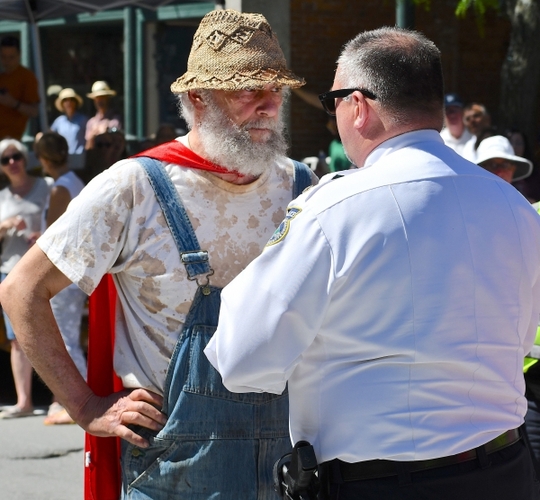BRATTLEBORO — A petition to take the fiscal year 2021 municipal budget to a town-wide vote has stalled, in part, because of COVID-19.
In response to community calls to redirect money from the police department, Kurt Daims, founder and executive director of the advocacy organization Brattleboro Common Sense, began a petition drive last week.
The Selectboard approved a $18.4 million fiscal year 2021 town budget, in a 3-2 vote, on June 16, and Daims's petition was intended to bring the municipal budget to a town-wide vote, as permitted in the town charter, in hopes of reopening the police department's budget.
Normally, Representative Town Meeting is the legal body that finalizes the budget at its annual meeting in March, this year postponed due to the COVID-19 pandemic and the governor's orders to stay home.
With the new fiscal year starting on July 1, a financial clock was ticking for the town.
As a result, a new state law, Act 105, gives Selectboards temporary power to approve a town budget and set a tax rate for 2020 without taking it to Town Meeting during the COVID-19 state of emergency.
According to a June 24 memo from Town Attorney Bob Fisher of Fisher & Fisher, because Representative Town Meeting did not vote on the budget yet, the petition is null and void.
Fisher wrote that the town charter “is for a referendum from a final vote on a warned article taken by RTM.”
“Here, we have no such action having been taken, and therefore the petition is moot and without force and effect,” the attorney wrote.
Assistant Town Manager Patrick Moreland echoed Fisher's memo in a Friday interview, saying that the petition - at least in its current form - is done.
“That section of the Charter is pretty straightforward,” he said.
On Monday, Daims said his organization decided against submitting the petition in light of Fisher's memo.
Ultimately, Brattleboro Common Sense didn't want to hold up the town budget, he said, but he added that he's “very disappointed with Bob [Fisher].”
Fisher's memo could land the town in court, Daims said, noting that Brattleboro Common Sense prevailed in a previous court case in 2009.
“[Fisher] should know better than to put the town through that kind of legal rigamarole, ” Daims said. “I don't want to do that. We don't want to delay the town budget with a long court case.”
Instead, Daims said, the organization wants to keep the focus on democracy and reforming the police department.
The board needs to show it's responsible to the community by acting quickly to make changes in the police department, he said. Daims plans to focus on the Selectboard's relationship to the community.
The board needs to “create proper openings for public input,” Daims said. “They haven't been doing that. Not only do we have a problem with general lack of participation in the democratic process, and a restrictive charter which severely limits people's right to bring petitions but, on top of that, there are practical limits to people's participation because of social distancing.”
Daims added that with so much of town government moving online, such as meetings and voting, the state should have provided equal online opportunities for citizens, such as filing online petitions.
In Daims' opinion, other areas in the budget need scrutiny in addition to the police department's.
“The town in its budget is not recognizing the emergencies that stand before us,” he said. “The police violence - that's an ongoing emergency, and that should be addressed.”
Daims also stressed that the petition is not a comment on the work of Police Chief Michael Fitzgerald.
The town in its budget also failed to recognize the climate crisis emergency, he said.
In Daims' opinion, the town needs to have surplus money in order to respond to the more extreme weather events and flooding that accompany climate change. People like farmers are going to need more help in the future, he added.
“We need to prepare by having money,” he said. “So, in those terms, every extraneous expense is a denial of the climate crisis we're in,” he said.
One extraneous expense in Daims' opinion is the planned purchase of a new fire engine.
The fire department does a good job preventing fires, so why spend the money on a new engine? he wondered.
Daims also said more money should go to the Human Services funding beyond the approximate 1 percent of the current town budget. According to Daims, in the 1930s, the town provided much more money in terms of relief to the poor.
He said he initially circulated the petition to follow up the community conversations with action.
“People are just speaking their minds as if that's all there is to it, and there's no follow up,” Daims said. “They think they're done after they speak their minds, but there's elections and litigation and legislation. These are the big things to change.”
Daims said that “demonstrations are the start, maybe, but you've got to follow up with laws and being in office and the long-term work. We've got to do a lot more after we write a letter and after we raise our protest sign.”
According to Moreland, the Selectboard will discuss scheduling a time for Representative Town Meeting at its July 7 meeting. He expects the board will finalize the meeting's warning by July 21.
